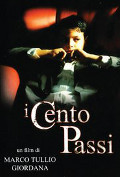
Italy 2000
Directed by
Marco Tullio Gioradana
114 minutes
Rated M
Reviewed by
Bernard Hemingway

One Hundred Steps
Synopsis: It is the late 1960s. Luigi Impastato (Luigi Maria Burruano) lives in Cinisi a small Sicilian town dominated by the Mafia, for whom he works. Strongly influenced by the era's rebellious spirit and local left politics, his eldest son Peppino (Luigi Lo Cascio) grows up to be a vocal campaigner against the Mafia, putting both himself and his family at dire risk.Based on real events, One Hundred Steps covers territory which in many ways is quite familiar - the ways of the Mafiosi, and less a theme of American film than European, the struggles of the idealistic left New Guard against a corrupt Establishment.
As the story is rooted in Italian (and Sicilian) political and cultural history undoubtedly some things of value will be lost on an English-speaking audience. Not least of which is the language itself. Peppino makes much use of satirical comedy, both in street theatre events and radio broadcasts, which is in the Commedia D'ell Arte tradition, best known to Western audiences from the work of Dario Fo. Poetry and the poetics of the Sicilian dialect however are particularly important in appreciating the world view and behaviour of the protagonists of this drama, a view rooted in sadness and struggle. Having to absorb this in the form of sub titles not only is a loss of an important intrinsic aesthetic dimension, but also detracts from the visual aspect (as one needs to do a lot of fast reading to keep up with the dialogue).
The script ties together the personal and political themes of Peppino's life skilfully, and Luigi Lo Cascio does a compelling job of portraying his character, ably supported by a fine cast. Costume and set design are both spot on, the film looking like it was made in the late '70s (although I did notice a goatherd with a reversed baseball cap). My only significant question mark concerned the choice of music, which is an eclectic mix of British Top 40 hits like Ballroom Blitz and Whiter Shade of Pale. Given Peppino's strongly developed sense of regional identity and the existence of a well-developed tradition of Italian popular music, it seemed an odd selection, suggesting perhaps that the producers had an eye on an English-language audience (it was a contender for Best Foreign film at the 2001 Academy Awards).
How successful they have been in reaching a broader audience is another matter. There were only 4 other people in the cinema when I saw this. Although there is nothing new here, the stylish treatment of the story (Coppolesque scenes of family gatherings, exploding cars etc.), a well-crafted script, excellent art direction and strong performances make this a well-rounded production.

Want more about this film?


Want something different?




